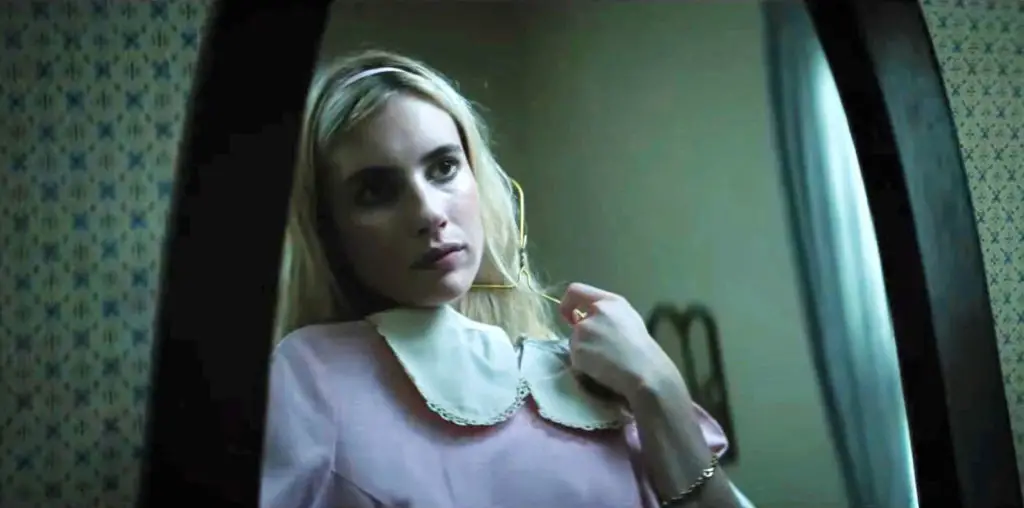
I can’t remember the last time the writer/director/producer of a film also went topless on screen, but if that’s what you’re looking for, here it is, courtesy of Elisabeth Fies: “this is my movie, and these are my boobies!” With that cinematic first having been racked up, “The Commune” goes on to ask an important question:
What makes an attractive blonde California valley girl want to gouge her eyes out with knitting needles?
The answer ought to be clear to us all: Hippies.
Jenny Cross’s dad is a hippie. Jenny (Chauntal Lewis) is sent by her mom to visit dad in a remote Sonoma County new-age colony full of granola-eating caricatures. Dad is the leader of the commune. His dozen-odd followers spout cliches about goddess worship and free love, while literally hugging their 500-year old tree. Fifteen-year-old Jenny, for her part, is a narrow-minded conservative Christian mall girl, whose main lament about the closest town is the lack of cookie-cutter chain stores. Our sulky and materialistic protagonist hates everything about the healthy food, religious freedom, and the natural way of life that her dad and his followers practice.
As Jenny, Chauntal Lewis is the best thing in the film. Unfortunately, she is meant to be fifteen, but Lewis looks every bit her real-life age of twenty-five. This is doubly unfortunate since Stuart Bennet and director Fies (playing Jenny’s separated parents), don’t seem to be much older than Lewis. Both are miserable actors, although they both positively shine in comparison to Adrian Lee as Rhea, the doctor’s lover and lieutenant. Every single word coming out of her mouth sounds like she was reading it off of a sloppily written cue card, and without her reading glasses handy.
Needing a respite from the incense and tofu, Jenny goes into town and meets Puck (David Lago), another stereotype: the modern rocker hatched of the James Dean mold, tough but sensitive, aloof but desiring love, rebellious but kind. Jenny and Puck do what teenagers (or twenty-somethings playing teenagers) do, causing Jenny’s dad to forget his notions of free love, at least where his daughter is concerned. At this point, “The Commune” tries to build tension by dropping clues about darker cultish behavior within the nauseatingly open minded commune, as well as clues about a possible molestation that Jenny once suffered, plus further clues about how weird and evil it is to avoid fast food and conspicuous consumerism. Jenny’s mom gives her a mission to dig up dirt on dad, so that he’ll be pressured to drop some sort of nebulous custody battle. None of these threads are fully explored, and the film seems to be having a lot of trouble figuring out what it wants to be. There is also a paternity issue that is never clearly resolved.
Due more to the script than to Lewis’s abilities, Jenny takes little action, mostly just wandering through the sets and reacting to almost every situation with an expression as though she’d just smelled one of the hippies farting patchouli. It is only in the last five minutes of the film that the vague hints of plot threaten to come together. An evil ritual is staged with laughable ineptitude, as poor Jenny meets a horrible destiny. Jenny Cross probably doesn’t deserve her fate, but Chauntal Lewis definitely deserves better roles than this one.
In “The Commune,” anyone who isn’t a mainstream Christian, and/or anyone who likes nature, healthy food, or being nice to people is actually an incestuous killer who must be a member of a cult of freaks. Additionally, small-town charm is dull, while malls full of identical stores run by mega-corporations are clearly the only place that wholesome people shop. This is the attitude espoused by the heroine, and it is through her eyes that the entire story is told. Therefore, we must also conclude that it is the film-maker’s thesis. However, by the end of the film, the hippies end up in a better place than Jenny and Puck do. This further muddles the issue: who is Fies wanting us to root for here? There isn’t a likable character in the film, and when the unlikable villains defeat the unlikable heroes, all of whom are wooden caricatures of extreme left or right wing cliches, we end up with an unfocused mess of a film.

